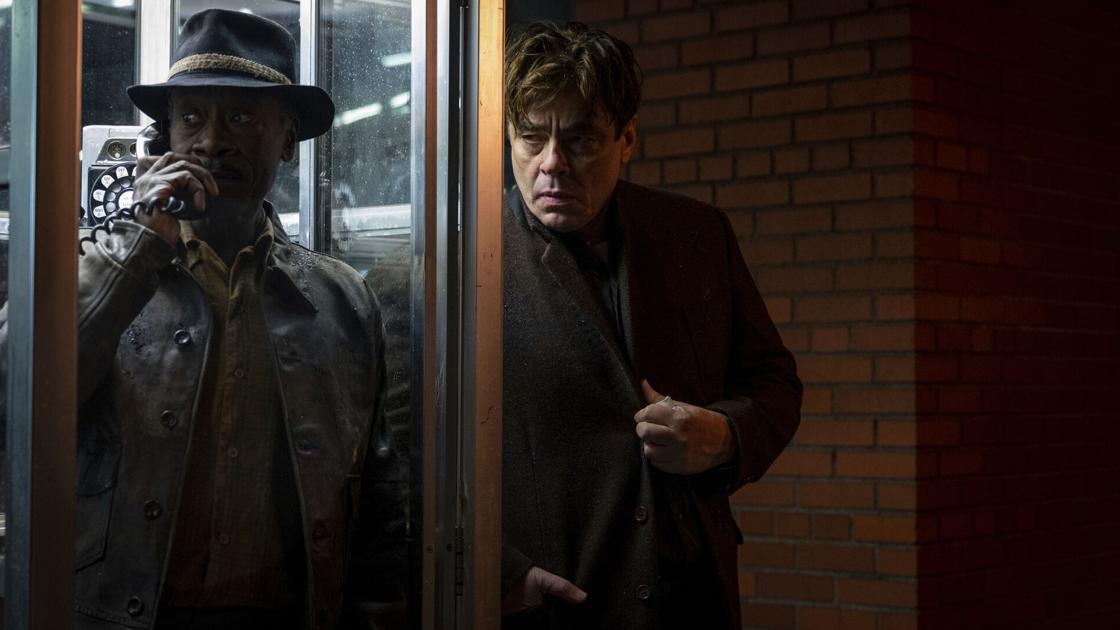What to Watch Verdict
Steven Soderbergh's latest cinematic experiment is a period throwback whose remarkable ensemble cast locks into the right groove.
Pros
- +
▪️ An ensemble cast for the ages.
- +
▪️ A dark commentary on the class system.
- +
▪️ Don Cheadle and Benicio Del Toro are excellent.
Cons
- -
▪️ The film's attempts to create modern resonance are shaky.
- -
▪️ Some of the players end up being underutilized.
- -
▪️ Compared to other Soderbergh crime films, this is a bit slighter.
This post contains mild spoilers for No Sudden Move.
The pandemic has forced many filmmakers and movie studios into a strange new world of having to be experimental with how they create stories. It’s no longer just a question of how audiences are going to see movies, but how the films themselves can be made safely. It is, perhaps, no surprise that one filmmaker who’s uniquely comfortable at experimenting is the distinctive Steven Soderbergh. The Academy Award-winning director has tried his hand at just about every style and genre, from shooting a thriller on an iPhone with Unsane to making an A-list-heavy dramedy on a cruise ship with Let Them All Talk. Soderbergh, though, is most at home with movies about criminals. Add to that a stacked cast, and of course his latest film No Sudden Move feels like a breath of fresh air even while technically being a throwback.
Set in Detroit, circa 1954, No Sudden Move focuses initially on Curt Goynes (Don Cheadle) a small-time criminal brought together with Ronald (Benicio Del Toro) by a mysterious figure (Brendan Fraser) to complete what seems like an enormously simple job. All they have to do is get a buttoned-down accountant (David Harbour) to take a single document out of his boss’ safe at a local bank. But anyone who’s read a good crime novel knows that the simplest tasks end up being the most complicated and challenging. Curt and Ronald soon realize that retrieving one document places them in the middle of something close to a nationwide conspiracy, related to redlining Black neighborhoods and the automotive industry.
No Sudden Move is at its strongest when indulging in its dime-store crime-novel inspirations. Screenwriter Ed Solomon has created a memorably pulpy, tough-guy vibe with each character, from Ronald and the married woman (Julia Fox) he’s seeing on the side, to the grouchy mobster (Ray Liotta) who happens to be that woman’s husband, to Curt, to a seen-it-all detective (Jon Hamm). Just listing out the cast alone is enough to make your eyes pop, but it helps that the ensemble is very much in line with the straightforward and gutsy ambitions of Solomon’s script, which largely eschews the deadpan comedy of past Soderbergh crime stories like The Limey and Out of Sight. And Soderbergh’s shooting and editing style -- as usual, he serves as both cinematographer and editor under aliases -- is also more straightforward, avoiding any elliptical qualities and focusing more on the brusque masculinity the mostly male cast brings to the proceedings.

For the most part, No Sudden Move works because it stays focused on its limited scope. Introducing a larger conspiracy, mostly connected to the pollutive aspects of 50s-era automobiles, is apt and fitting (at least until the film tries to provide a bit more historical context than is needed in its conclusion). But the reason why weaving that conspiracy into the story is so effective is because Curt and Ronald slowly become more cognizant of how minute their presence is in the grander story at play. They eventually come into contact with a confident and powerful figure -- portrayed by a Soderbergh regular, someone who feels contractually obligated to appear in as many of his films as possible now -- who makes it cruelly obvious that they’re pawns in a larger scheme even if they think they’re controlling the situation.
The first half of No Sudden Move is especially suspenseful because Curt and Ronald do seem particularly skilled at moving above their station and making a simple job turn more financially in their favor. But the grim clarity and inevitability with which the second half unfolds puts the story into a higher, more dramatically memorable gear.
And, of course, it just helps that Cheadle and Del Toro (reuniting with Soderbergh two decades after Traffic) are a lot of fun to watch together. Solomon’s script and their performances create a surprising dichotomy, in which Ronald seems more cautious and Curt more risky and aggressive, only to reverse things in the final act. Among the massive supporting cast, it’s worth noting just how good it is to see Brendan Fraser in a movie again; he’s only in a few key scenes, but just his presence alongside Liotta, Hamm, and many others is a reminder that he’s been away from the big screen for far too long.
No Sudden Move is but the latest entry in the HBO Max experiment, arriving on the streaming service this week. It’s a deliciously warped way to celebrate the July 4 holiday weekend, since the film has a very specific commentary to make about America and its history, both in terms of racial discrimination and the health of its citizens. Like Steven Soderbergh’s best films, No Sudden Move is an effective crime thriller; fortunately, unlike a couple of his other recent efforts, its attempts to create historical resonance don’t fall entirely flat. But this works best as a pulpy thriller, the kind that hearkens back to 1950s crime novels that you’d hide underneath a more adult-seeming book to hide its slick, trashy thrills.
Josh Spiegel is a freelance cultural critic who has been published in Slashfilm, SyFy, ScreenCrush, The A.V. Club, The Hollywood Reporter, The Washington Post and others. His favorite films include Singin’ in the Rain, The Rocketeer, Pinocchio and A Matter of Life and Death. His favorite TV shows include Ted Lasso, Only Murders in the Building, Deadwood and Lost. He lives in Phoenix with his wife, two sons and too many cats.












